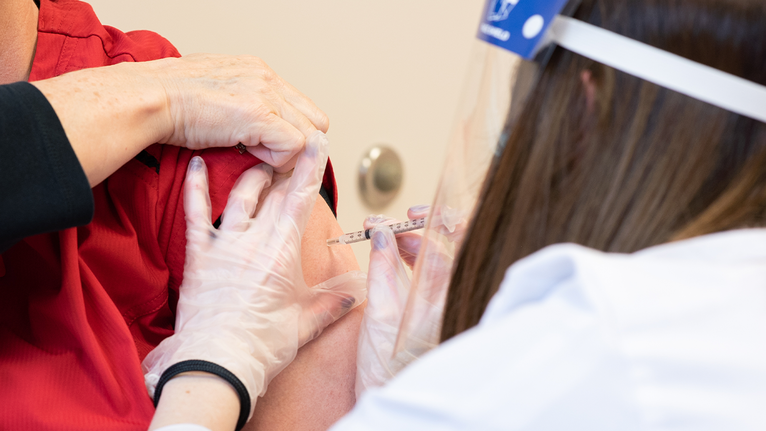Here are six things you should know about COVID-19 booster doses and additional doses.
1. What booster doses are currently available?
A booster dose/shot is available to the following individuals, age 18+:
- Individuals who completed both doses of the Pfizer-BioNTech or Moderna COVID-19 vaccine at least six (6) months after the second vaccination, and who meet the age and health criteria.
- Individuals who completed a single dose of the Janssen (Johnson & Johnson) vaccine at least two (2) months after the first vaccination, and who meet the age and health criteria.
Eligible individuals can now request a booster dose from a manufacturer that is different from their original COVID-19 vaccine manufacturer (based on availability).
Visit the CDC website for more information about available booster doses and eligibility.
2. What is the difference between additional doses and booster shots?
A third, or additional dose, of the Pfizer or Moderna COVID-19 vaccine was previously approved by the FDA and CDC as part of the initial two-dose vaccine series for severely immunocompromised people. This was due to evidence showing that some immunocompromised people did not mount a good enough immune response with the initial two doses alone, so a third dose may help. People age 12 and older, whose immune systems are compromised moderately to severely, are currently eligible to receive a third dose of mRNA COVID-19 vaccine after the initial two doses.
However, COVID-19 “booster shots” are typically for anyone, age 18+, who is eligible to receive a vaccine. These are beneficial to keep up immunities, as over the course of time, there are trends showing that after many months, the neutralizing antibodies that the vaccine helped create may start declining. Booster dose vaccinations for COVID-19 and other vaccine types can help because they are meant to remind the body’s immune system to keep those antibodies up.
If immunocompromised people have already received an additional COVID-19 vaccine dose, they would not need to get a booster shot at this time.
3. Where can I make an appointment for a COVID-19 booster shot?
Individuals who are eligible for a booster shot can make an appointment at any pharmacy that is offering it. Booster dose and other COVID-19 vaccine appointments are also available at the UC Health Outpatient Pharmacy located at Hoxworth Center, 3130 Highland Ave., Cincinnati, OH 45219. There will be no out-of-pocket cost for individuals who get the vaccine at UC Health.
4. How do I schedule an appointment for a COVID-19 vaccine (including booster shots) at UC Health?
Appointments at UC Health are required to receive a COVID-19 vaccine. You can schedule an appointment at UC Health through one of the following ways:
- Call 513-584-DOSE (3673) weekdays between 8 a.m. and 5 p.m.
- My UC Health (MyChart): Schedule your vaccination appointment by logging onto your My UC Health account and selecting the option to schedule an appointment under the “visits” section (use MyChart app or uchealth.com/myuchealth).
5. What are the side effects of the booster?
According to the CDC, third-dose reactions reported were similar to those of the two-dose or single-dose initial vaccinations. Visit the CDC website for more information about vaccine and booster side effects.
6. Are vaccines effective in protecting against COVID-19 variants such as the delta variant?
According to the CDC and available data, COVID-19 vaccinations continue to be highly effective in reducing risk of severe disease, hospitalizations and death, even against the COVID-19 variants, such as the delta variant. Vaccination remains the best way to protect yourself and reduce the spread of the virus and help prevent new variants from emerging.
